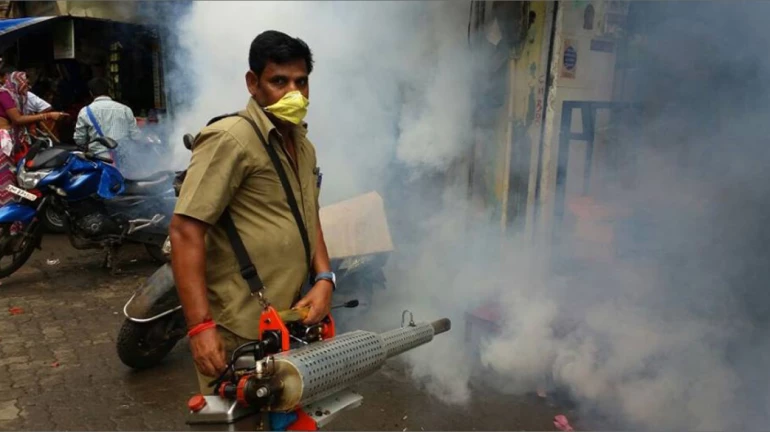
Dengue is a viral infection that is transmitted to humans through the bite of an infected mosquito, and the virus responsible for causing it is called the dengue virus. In a year, doctors say that on an average, nearly 800 to 1,000 cases of dengue are reported.
The signs and symptoms of dengue fever are high-grade fever or headaches with pain in the joints behind the eyes; muscle and bone rash on the body; severe headache; nausea, vomiting; and abdominal discomfort. And if things start getting severe, then one may get rashes on the skin, bleeding from the nose or gums, and bruising easily.
In an interaction with Mumbai Live, Dr Sulaiman Ladhani, Consulting Chest Physician MD Chest and Tuberculosis, Masina Hospital, Mumbai shares his expertise on the disease.
Ladhani advises, “If there are any of these symptoms, you should immediately get your blood tests done, which may show a decrease in counts and platelets. Immediately, a doctor should be consulted for the same.”
Further, he adds, “Since it's a viral infection, there is no specific medicine to treat dengue. However, a simple paracetamol can be used. Aspirin and other strong anti-inflammatory drugs should be avoided because they can worsen bleeding, but the best treatment, if mild, is to rest, drink plenty of fluids, hydrate, and seek medical treatment.”
Ladhani elaborates, “ If not treated on time, it can become critical and the liver gets affected. There may be bleeding in the body. There could also be bleeding difficulty because the lungs get affected, and it can lead to the terminology which is called either hemorrhagic fever or dangerous shock syndrome. These are critical conditions where once a patient goes, the treatment becomes difficult and the chances of survival are reduced. The patient may have to be put on over-ventilator support.”
He voices, “There is no age distinction, but early detection, adequate rest and hydration, and medical treatment is the best way to take care of this illness.”
In the conversation, he suggests a strategy to curb the incidence of dengue. The first step he says is to find and destroy mosquito breeding places. He utters that water collection should be avoided in homes because they tend to be the prominent breeding grounds for mosquitos. Water collection can happen near plants, thus, at such places, the water should be cleaned to prevent mosquito breeding.
Secondly, he advises self-protection from mosquito bites. Ladhani voices, “During the summer, it is always recommended that we wear light clothing, using mosquito repellents or creams, as well as mosquito nets.”
In addition to this, Ladhani advocates fogging which he believes is one of the foremost ways to prevent dengue. He mentioned, “BMC primarily inspects areas where there may be potential breeding grounds, such as construction sites. Normally, when they inspect the sites, they carry out regular fogging to ensure that mosquitoes are destroyed. They spray some oil into the water collection to destroy the larvae of the mosquito.”
Ladhani remarks, “BMC hospitals in addition to treating patients also put up advisories and prevention instructions for the general population.”
He then shifts his focus to the coronavirus pandemic by remarking, “Due to COVID-19, the number of tests were less owing to constrained mobility amid the lockdown. Because of these limitations, the actual numbers are not known.”
He mentions, “The healthcare industry had a difficult time coping with dengue during COVID-19, mostly because the people were indoors. The inspection by the authorities like BMC for breeding grounds of the mosquito inspection and foregoing could not be carried out too. With coronavirus in mind, not much attention was given to dengue cases, its treatment or prevention method.”
Ladhani moves on to differentiating coronavirus from dengue. “Dengue causes high-grade fever, body aches, headaches, muscle pain. The patient also feels weak and dehydrated. In COVID-19, on the other hand, patients get symptoms that are similar to the flu, such as a headache, running nose, cough, and fever, which is persistent. The patient may feel breathlessness and saturation.”
He pronounces, “The best way is to do a test and confirm dengue. A simple blood test would tell us if the WBC count and platelets are low. There is a specific test for dengue NS1 which can tell us whether the dengue is positive and not for coronavirus.”
“Likewise, RT-PCR is the best way to confirm COVID-19 but one could also check oxygen saturation at home. Thus, clinically, there may be an overlap of symptoms, but the best way to deal with it is to visit a doctor, get a blood test, and have RT PCR done to ensure appropriate medical treatment.”
Also Read: Psychologist: Mental Health Is A Parallel Pandemic For The Youth In India





